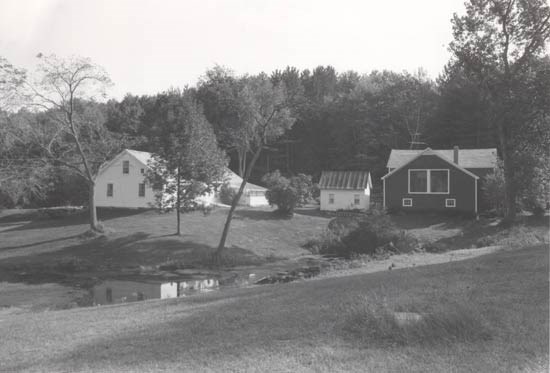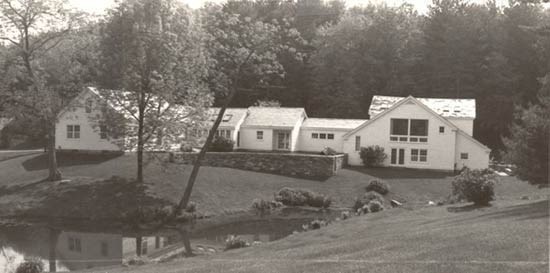
NPS Photo
Robert Frost Farm, "The Gully"
South Shaftsbury, VT
Designated an NHL: May 23, 1968
Designation withdrawn: March 5, 1986
The Robert Frost Farm in South Shaftsbury, known as "The Gully,"* was closely associated with the poet's life and work between 1929 and 1938. While this was his residence, he received two Pulitzer Prizes, in 1931 for Collected Poems and in 1937 for A Further Range. Frost wrote many of the poems found in the latter volume at "The Gully."
Robert Frost was born on March 26, 1874, in San Francisco, California. He was the son of William Prescott Frost, Jr., a newspaper reporter from Lawrence, Massachusetts and Isabel Moodie Frost, a former teacher who had been born in Edinburgh, Scotland. Robert was eleven years old when his father died of tuberculosis. Honoring a last request, the family took the body back to Lawrence for burial. No funds were available for the return trip and Mrs. Frost settled with her children - Robert and his younger sister Jeanie - in Salem, New Hampshire, where she earned a living for several years by teaching school.
Frost entered Dartmouth College in the fall of 1892 but disliked formal study so intensely that he left after only two months. During the next two years, he earned a living in miscellaneous ways while sending poems to uninterested editors. In 1894, to celebrate his first sale of a poem - "My Butterfly- An Elegy" - he privately printed six of his poems in a booklet entitled Twilight, an edition limited to two copies, one for his fiancee Elinor White and one for himself.
After his marriage in 1895, Frost taught for two years at his mother's private school in Lawrence and then spent the next two years as a special student at Harvard. In 1900, for health reasons, he moved to a small farm in Derry, New Hampshire, and conducted a small poultry business there until 1905. Failing as a farmer, he taught various subjects at Derry from 1905 until 1911 and then moved to Plymouth, New Hampshire, where he taught psychology for a year in the New Hampshire State Normal School.
By 1912 Frost had decided to devote his main efforts to poetry, and fortified with the money obtained from the sale of his Derry farm and an annuity of $800 left him by his grandfather, he set sail for England with his family. Settling first in Buckinghamshire and then in Herefordshire, he cultivated the friendship of a number of English poets. Composing a few new poems and selecting others written at Derry and elsewhere, Frost prepared a volume for publication. Mrs. Alfred Nutt of London brought out the first book, A Boy's Will, in 1913. A second, North of Boston, appeared the following year.
The cordial praise given these poems by British men of letters won him lasting friendships in England and attracted the surprised attention of critics and editors in his native land. When he returned to the U.S. in 1915, his first two books had been reissued in New York and North of Boston soon became a best seller. A third volume, Mountain Interval, was published in 1916.
After his return from England, Frost purchased a farm two miles west of Franconia in the White Mountains of New Hampshire. In 1917 he accepted a position as Professor of English at Amherst College. During the rest of his life, Frost spent a part of almost every year teaching and working in a college atmosphere. As his reputation grew, the demands made upon him as teacher decreased, and he held a number of fellowships at various colleges, all of which gave him a great deal of freedom to pursue his art. His major appointments were at Amherst (1917-1920, 1923-1925, 1926-1938, 1949-1963), the University of Michigan (1921-1923, 1925-1926), Harvard (1939-1942), and Dartmouth (1943-1949).
Throughout his life, Frost continued to return to the New England countryside when the weather was good and his schedule permitted. In 1920 he bought the Peleg Cole Farm in South Shaftsbury, Vermont. Eight years later Frost purchased a second property in South Shaftsbury, a 153-acre farm known as 'The Gully." The main house, a one-and-one-half story frame and clapboard Cape Cod cottage, was built about 1790. During 1929 Wade Van Dore helped Frost to renovate the property for occupancy; a former corn crib was remodeled for use as the writer's studio and a one-room frame structure was moved to the farm and prepared for use as studio space as well. The Frost family spent their summers there from 1930 until the death of Frost's wife in 1938, and considered the farm their main residence.
During the period Frost lived at "The Gully" he received his second and third Pulitzer Prizes. He also held a position at Amherst College during this period. The agreement with the college, however, was a very elastic one, and Frost was free to lecture and even teach at other institutions. In 1931, 1933, and 1935, for example, he taught for short periods at the New York School for Social Research, and in the spring of 1936, he gave the Charles Eliot Norton lectures at Harvard University. Despite his academic schedule, Frost continued to produce great poetry during the same period. Both his Collected Poems (1930) and A Further Range were honored by the Pulitzer Prize. Frost wrote many of the poems found in the latter volume at "The Gully," among them "Built-Soil," "A Record Stride," "A Drumlin Woodchuck," and the humorous piece, "To a Young Wretch."
Following the death of his wife, Frost spent very little time at "The Gully" although he retained title to the property until 1944, when it was conveyed to his daughter-in-law, his grandson, and the grandson's wife. In 1940, Frost purchased the Homer Noble Farm near Ripton, Vermont and until his death in 1963, spent the summer and fall of each year there. Springs were spent at Cambridge, Massachusetts and winters at the New England style bungalow that he built on rural land at Coral Gables, Florida.
Robert Frost reaped more honors during his lifetime than any other American poet before him. On four occasions he received the Pulitzer Prize for Poetry: in 1924 for New Hampshire, in 1931 for Collected Poems, in 1937 for A Further Range, and in 1943 for A Witness Tree. In 1939 he became the third poet in history to receive the coveted gold medal of the National Institute of Arts and Letters. In 1958 he was appointed Consultant in Poetry to the Library of Congress. Frost became such a national institution that he was asked to read a poem at the inauguration of President John F. Kennedy on January 20, 1961. Perhaps the most eloquent tribute paid to him after his death was made by a fellow poet, John Ciardi, who said simply: "He was our best."

NPS Photo
"The Gully" remained in Frost's family until 1963 when it was sold to the artist Kenneth Noland. With the exception of the barn, converted for use as the artist's studio, and the installation of various pieces of abstract sculpture on the lawn, few changes had been made to the farm. "The Gully" was designated a National Historic Landmark in May 1968, and at that time retained a high level of historic integrity.
Alterations made after 1979 by a new owner, however, were so extensive that the buildings no longer retained their historic appearance. The alterations did not meet the Secretary of the Interior's Standards for Rehabilitation. The landscape of the property, important in Frost's poetry, retained much of its historic integrity, however.
Unfortunately, while the landscape was important in Frost's life and work, the main house and its outbuildings were the essential elements of the Landmark designation. Their loss of historic integrity was not counterbalanced by the continued existence of the surrounding landscape. The Landmark designation of the Robert Frost Farm was withdrawn on March 5, 1986; the property remains listed on the National Register of Historic Places.
Two other sites associated with Robert Frost were also designated National Historic Landmarks in May of 1968. Both of these—the Robert Frost Homestead in Rockingham County, New Hampshire and the Robert Frost Farm in Addison County, Vermont—retain their designations.
*The farm was referred to in family correspondence as both the "Gully" and the "Gulley;" therefore, both variations are correct.
Last updated: August 29, 2018
